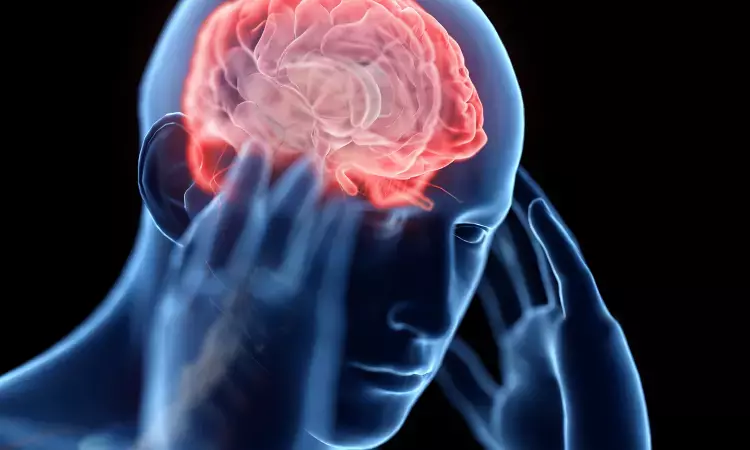- Home
- Medical news & Guidelines
- Anesthesiology
- Cardiology and CTVS
- Critical Care
- Dentistry
- Dermatology
- Diabetes and Endocrinology
- ENT
- Gastroenterology
- Medicine
- Nephrology
- Neurology
- Obstretics-Gynaecology
- Oncology
- Ophthalmology
- Orthopaedics
- Pediatrics-Neonatology
- Psychiatry
- Pulmonology
- Radiology
- Surgery
- Urology
- Laboratory Medicine
- Diet
- Nursing
- Paramedical
- Physiotherapy
- Health news
- Fact Check
- Bone Health Fact Check
- Brain Health Fact Check
- Cancer Related Fact Check
- Child Care Fact Check
- Dental and oral health fact check
- Diabetes and metabolic health fact check
- Diet and Nutrition Fact Check
- Eye and ENT Care Fact Check
- Fitness fact check
- Gut health fact check
- Heart health fact check
- Kidney health fact check
- Medical education fact check
- Men's health fact check
- Respiratory fact check
- Skin and hair care fact check
- Vaccine and Immunization fact check
- Women's health fact check
- AYUSH
- State News
- Andaman and Nicobar Islands
- Andhra Pradesh
- Arunachal Pradesh
- Assam
- Bihar
- Chandigarh
- Chattisgarh
- Dadra and Nagar Haveli
- Daman and Diu
- Delhi
- Goa
- Gujarat
- Haryana
- Himachal Pradesh
- Jammu & Kashmir
- Jharkhand
- Karnataka
- Kerala
- Ladakh
- Lakshadweep
- Madhya Pradesh
- Maharashtra
- Manipur
- Meghalaya
- Mizoram
- Nagaland
- Odisha
- Puducherry
- Punjab
- Rajasthan
- Sikkim
- Tamil Nadu
- Telangana
- Tripura
- Uttar Pradesh
- Uttrakhand
- West Bengal
- Medical Education
- Industry
ADHD Drugs Might Also Treat Alzheimer's Disease, find researchers

Researchers have found in pooled data analysis of the available research, study that drugs to treat attention deficit hyperactivity disorder (ADHD) might also successfully treat key aspects of Alzheimer's disease,
The research has been published online in the Journal of Neurology Neurosurgery & Psychiatry.
Clinical trials of noradrenergic drugs, which include antidepressants and medicines to treat high blood pressure and ADHD, are now warranted, say the researchers.
Noradrenergic drugs target the neurotransmitter noradrenaline, also called norepinephrine, which is released by a network of specialised noradrenergic neurons.
This network is critical for arousal and many cognitive processes, including attention, learning, memory, readiness for action, and suppression of inappropriate behaviours.
Noradrenergic disruption occurs early in Alzheimer's disease and contributes to the cognitive and neuropsychiatric symptoms that characterise the condition, suggesting that the noradrenergic system would be a good target for drug treatment.
The researchers therefore looked for clinical trials published between 1980 and 2021 in which noradrenergic drugs, such as atomoxetine, methylphenidate, and guanfacine, had been used to potentially improve cognitive and/or neuropsychiatric symptoms in people with neurodegenerative disease.
They included a total of 19 randomised controlled trials focusing on Alzheimer's disease and mild cognitive impairment, involving 1811 patients: six of these trials were judged to be 'good' quality, seven as 'fair', and six as 'poor'.
The results of 10 of these trials, involving 1300 patients, were pooled for global cognition—orientation/attention, memory, verbal fluency, language and visuospatial ability.
This showed a small, but significant, positive effect of noradrenergic drugs on overall cognition, as measured by the Mini-Mental State Exam or the Alzheimer's Disease Assessment Scale.
The results of 8 clinical trials, involving 425 patients, were then pooled for behaviour and neuropsychiatric symptoms, agitation and apathy. And this showed a large positive effect of noradrenergic drugs on apathy, even after removing outliers to account for differences in trial design and intended outcomes.
"Repurposing of established noradrenergic drugs is most likely to offer effective treatment in Alzheimer's disease for general cognition and apathy," say the researchers.
They add:"There is a strong rationale for further, targeted clinical trials of noradrenergic treatments in Alzheimer's disease."
But several factors need to be considered first, they caution. These include appropriate targeting of particular groups of patients and understanding the dose effects of individual drugs and their interactions with other treatments to minimise the cons and maximise the pros of noradrenergic drugs, they say.
Reference:
David MCB, Del Giovane M, Liu KY, et alCognitive and neuropsychiatric effects of noradrenergic treatment in Alzheimer's disease: systematic review and meta-analysisJournal of Neurology, Neurosurgery & Psychiatry Published Online First: 05 July 2022. doi: 10.1136/jnnp-2022-329136
Dr Kamal Kant Kohli-MBBS, DTCD- a chest specialist with more than 30 years of practice and a flair for writing clinical articles, Dr Kamal Kant Kohli joined Medical Dialogues as a Chief Editor of Medical News. Besides writing articles, as an editor, he proofreads and verifies all the medical content published on Medical Dialogues including those coming from journals, studies,medical conferences,guidelines etc. Email: drkohli@medicaldialogues.in. Contact no. 011-43720751


